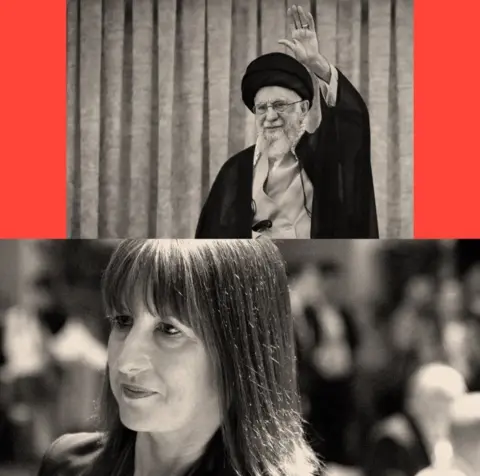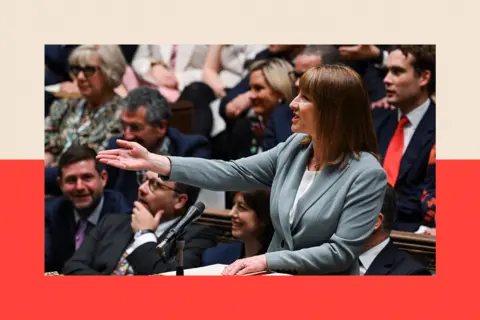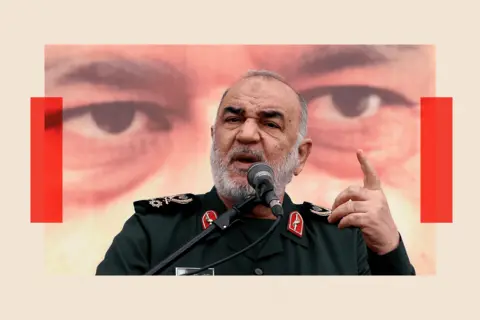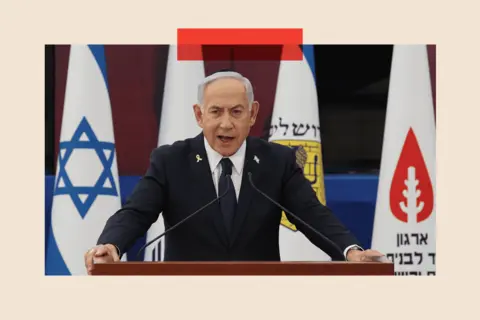Crisis - which crisis? Israel-Iran another huge challenge for government

 BBC
BBCOn a normal weekend, MPs might try to snatch a bit of downtime, or squeeze in a game of pin the tail on the donkey at a constituency summer fete.
Ministers might be ploughing through documents in their red box, or rehearsing the next round of "lines to take" - the rough scripts circulated around Whitehall so they all say more or less the same thing whenever they are near a microphone.
Yes, it's as deliberate as it is maddening.
Instead, this weekend, as buildings burn in Tehran and Tel Aviv, the government is staring at a crisis. Another one. A moment that has big implications for the world's security and stability, as well as how we pay our way.
Only 48 hours after the chancellor - who'll join us tomorrow - carefully carved out how she wants to spend taxpayers' cash for the next few years, Israel struck Iran, Iran hit back, the oil price surged, and the government's emergency committee was scrambled.
No government can stop the rest of the world "going crazy", as one City source described it. But now, they added, "we have multiple genuine global crises", when even "one shock is enough to shift the goalposts".
"There do genuinely seem to be more crises," a senior Labour MP tells me.
Governments always have to deal with the universe as they find it, not the world as they wish it to be. But what confronts Labour might have most of us hiding under the duvet, and the sheer number of dangers seem to be multiplying.
A senior Whitehall figure suggested there were moments in the Cold War that were "more perilous", but the problems then were "more simple – it's so complicated now".
Abroad, conflicts rage – most notably, the years' long face-off between Israel and Iran that has exploded into a deadly and direct phase this week, and a belligerent Russia fighting war on the edge of our continent.
India and Pakistan have been squaring up to each other too, and China is jostling for dominance. The government has already promised it will spend more - a lot more - on protecting the country in the face of all those threats. Remember, they have not told us where the cash is going to come for that in the long term.
But don't forget our supposedly most trusted ally in the White House is flirting with a different kind of war, a trade war, by slapping on, then taking off, then slapping on costly tariffs on exports.
 Reuters
ReutersAt home, ministers will also still gladly describe many aspects of the UK as dire, and remind you the state of government was even worse than they expected when they walked into government nearly a year ago.
They talk about a prisons "crisis", a housing "crisis", the "broken" NHS, as well as the climate "crisis". The list goes on.
This week's Spending Review was designed to be their big answer to those problems. Tens upon tens of billions of pounds of taxes and borrowing for public services and long-term projects, like rail lines and power stations.
The chancellor's allies reckon the big review went down pretty well. It has not, as of yet, created any new political problems at least.
"The biggest fear on a day like that is that it all unravels and that hasn't happened," a government source said, sighing that No 11 has avoided an ominshambles, an embarrassing row over taxing sausage rolls or a serious breach in their friendship with business.
Despite enormous amounts of spending, money will still be painfully tight in some parts of government. But insiders reckon Reeves' plans have given Labour backbench MPs things to boast about – note the number of specific towns given a long-term project and a name check in the chancellor's speech.
But there are other tricky trends the government is less fond of pointing out, that others call "crises" - notably the country's debt, and our shifting demographics.
In short – the debts are massive, there are more older people to look after and fewer proportionately of working age to pay to support them - profound long-term problems that will pile more pressure on the bill for the nation's health and welfare bills. And few mainstream politicians would currently suggest allowing more workers from overseas to come to the UK to change that equation.
"No politician will tell it as it is," a former minister worries privately, arguing that none of our leading politicians are being open about the coming strain on our existing economic model.
"We're not yet in a doom loop – but we need to wake up."
Sir Keir Starmer would likely object to the comparison, but another senior figure suggested, just as former Conservative PM Boris Johnson believed in having his cake and eating it, that Labour is trying to have it all. They said the government "isn't addressing the fundamentals – we can't deal with debt, defence, and growth while having over half the state going towards the NHS and welfare, it doesn't add up".
 Getty Images
Getty ImagesThe ledger will certainly be even harder to balance if the outburst of violence between Iran and Israel becomes a lasting conflict. Not because of decades of regional agony, but the brute effect on the oil price which could ultimately feed through to higher prices for everyone and more strain on the economy.
Rachel Reeves is already short on cash for a rainy day. If the conflict is prolonged, those potential tax rises in the autumn might well arrive. But rather than panic publicly, government sources point to the rising price of oil as another reminder that they are making the right decisions at home - like planning new power stations.
"We need resilience to navigate short term crises," they said.
"That's what we are building."
The source also recalled the "Oh my God moment" when Trump introduced the world to his surreal tariff scoreboard, saying the UK had put itself in a far better position to navigate turmoil than its predecessors.
A former senior minister also credited the PM's political positioning towards the White House. It had involved what they described as a "sickening amount" of sucking up, but meant that "in practical terms, they are probably as in as good a position as anybody".
 Getty Images
Getty ImagesThe prime minister's allies also point, with some legitimacy, to Sir Keir's intense efforts to make like a statesman, trying to coordinate action on Ukraine, and patching up some of the UK's fraught relationships with European allies.
But there is no doubting this is a fretful moment, with adversaries and conflicts around the world and deep-seated problems at home. Labour has zealously talked up its appetite to reform everything in sight, to respond to the gravity of the situation it inherited.
The prime minister is certainly visibly busy on the world stage, again at the G7 this weekend. Labour is pumping significant amounts of extra cash into public services. But it's fair to wonder if their actions so far really match the scale of the promises they made to "rewire" the country, and the ever more fraught situation they face on so many different fronts.
When you hear politicians talk of a time of crisis, you might well ask, which one?
BBC InDepth is the home on the website and app for the best analysis, with fresh perspectives that challenge assumptions and deep reporting on the biggest issues of the day. And we showcase thought-provoking content from across BBC Sounds and iPlayer too. You can send us your feedback on the InDepth section by clicking on the button below.


Sign up for the Off Air with Laura K newsletter to get Laura Kuenssberg's expert insight and insider stories every week, emailed directly to you.
